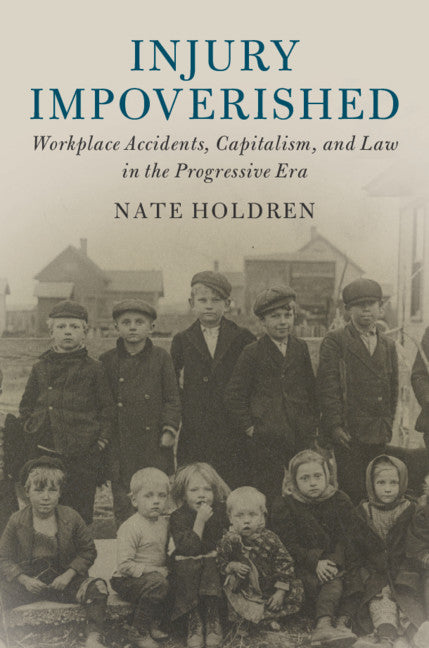Freshly Printed - allow 8 days lead
Couldn't load pickup availability
Injury Impoverished
Workplace Accidents, Capitalism, and Law in the Progressive Era
Argues that workers' compensation laws created new employment discrimination against disabled people and a new injury culture that treated employees and their injuries instrumentally.
Nate Holdren (Author)
9781108488709, Cambridge University Press
Hardback, published 9 April 2020
300 pages
23.5 x 15.8 x 2.2 cm, 0.57 kg
'Meticulous and gripping in equal parts, Injury Impoverished offers a compelling and beautifully written history of the emergence of workers' compensation law in the United States. More than that, however, this book delivers a flash of lightning that illuminates the precise legal contours of the terrifying machine that dismembered and reprocessed the American working class during the first decades of the twentieth century. Essential reading for every cog in the machine.' Rose Sydney Parfitt, Kent Law School, and author of The Process of International Legal Reproduction: Inequality, Historiography, Resistance
The late nineteenth- and early twentieth-century US economy maimed and killed employees at an astronomically high rate, while the legal system left the injured and their loved ones with little recourse. In the 1910s, US states enacted workers' compensation laws, which required employers to pay a portion of the financial costs of workplace injuries. Nate Holdren uses a range of archival materials, interdisciplinary theoretical perspectives, and compelling narration to criticize the shortcomings of these laws. While compensation laws were a limited improvement for employees in economic terms, Holdren argues that these laws created new forms of inequality, causing people with disabilities to lose their jobs, while also resulting in new forms of inhumanity. Ultimately, this study raises questions about law and class and about when and whether our economy and our legal system produce justice or injustice.
Introduction: injuries and abstractions
Part I. The Eclipse of Recognition and The Rise of The Tyranny of The Table: 1. Commodification and recognition within the tyranny of the trial
2. Injury impoverished
3. Suffering and the price of life and limb
Interlude: trampler and tramped-on in the Cherry Mine fire
Part II. New Machineries of Injustice: 4. The disabling power of law and market
5. Insuring injustice
6. Discrimination technicians and human weeding
Conclusion: resistance and aftermath
Coda: narrative, machinery, law.
Subject Areas: Legal history [LAZ], Economic history [KCZ], Modern history to 20th century: c 1700 to c 1900 [HBLL], History of the Americas [HBJK]


